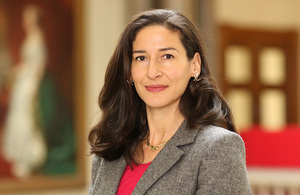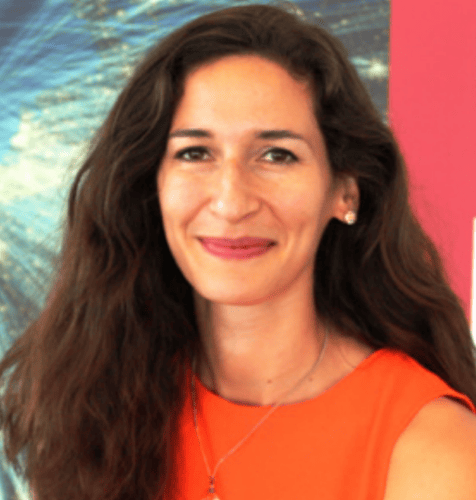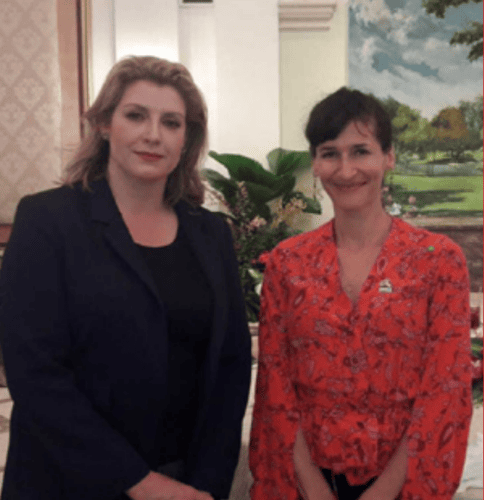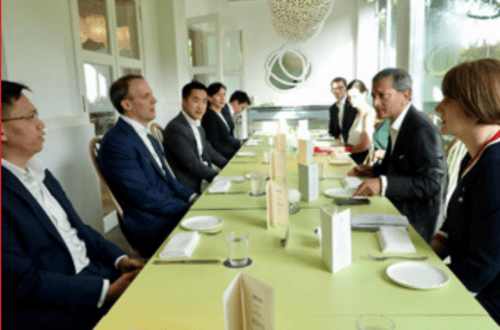Alexandra McKenzie
British High Commissioner to Brunei Darussalam

Alexandra is part of our amazing Esher Alumni. She says her passion for history, languages and philosophy was nurtured at Esher Sixth Form College and set the foundations for an extraordinary career in the Foreign Office. Working in Berlin, Paris, Bangkok, Beijing and Singapore, she has just been appointed the British High Commissioner to Brunei Darussalam and will take up her appointment during August 2024.
While in Berlin, she hosted our Politics A Level students at the Embassy, who were visiting the city as part of Wider Skills Week. Now, whenever she’s back in town, she returns to Esher to share her experiences with students. Here she reveals how studying Philosophy, in particular, put her in good stead for the future.
Subjects studied: Philosophy, History, German and Psychology (AS)
Secondary School: Teddington School
Left Esher: 1996
What are you doing now?
I’m currently the Deputy Director for Northern Ireland Policy at the Department for Environment, Food and Rural Affairs (DEFRA), and from August I’ll be the British High Commissioner to Brunei Darussalam.
What were your course highlights at Esher?
I really loved all my courses. Philosophy was my favourite; I enjoyed learning about the Greek philosophers and the intense debates we would have in class, particularly around ethics. Every now and then, the Classics teacher (Baz) would pop in and give us some illuminating context (I vividly recall him explaining what a catamite was).
How did your teachers inspire you?
So much of what I learnt at Esher had an impact on my later studies, interests and eventually my career – though I wouldn’t say I had it all planned out at the time! One of my History teachers, Mr. Doig, was really old-school and a fantastic storyteller. I loved his classes on dictatorships in the 20th century. It gave me a fascination with World War Two that I nurtured with my own reading. It meant I was reasonably well-informed about the defining moments in modern history for when I was posted to Berlin, Paris, Bangkok, Beijing and Singapore.
Keith Maslin was my Philosophy teacher; he inspired a love of philosophy that meant I went on to study it at university. His passion for his subject was really infectious. He’d bring the debates to life by getting us to argue everything in class, and had a real respect for and delight in our discussions, despite the fact he’d heard generations of students debate the same two-thousand year-old arguments. He made it always seem fresh.
What did you do after Esher?
I went to the University of Bristol to study Philosophy and German. I just wanted to keep learning about the two things I was most interested in and the course at Bristol enabled both those things. I got to spend a year in Germany, and I still loved philosophy and debating. It’s only in hindsight I can see that those are now the two things that define my career – going abroad and arguing!
What made you want to apply for the civil service?
I wanted to do something I thought was meaningful. I had no interest in making money for someone else, which is how I thought of working in the private sector. I understand now that it’s a lot more nuanced, but at the time, a career in business just seemed like pie charts and profiteering. I wanted to work in an international environment; I liked learning languages and I wanted to make a positive difference. A Foreign Office career seemed to offer an irresistible combination of allowing you to feel equally virtuous and glamorous.
What advice would you give someone thinking about a career in the civil service?
It’s still a job I absolutely love, despite ups and downs. The downs are generally to do with pay and conditions, it’s not a job I’d recommend to anyone who wants to make a shedload of money. But I know a lot of people who are dissatisfied with their careers; who go to the office miserable, who hate their bosses and / or colleagues, who dislike the drudgery or the hours, or who feel like their work has no meaning. I don’t feel any of those things. Every day, I love what I do. There is variety, there is challenge; you meet interesting people and learn a huge amount about all sorts of disparate things. What you do is clearly relevant and can make a positive impact. I feel lucky that I still feel that way after almost 20 years in the Foreign Office.
What have been your career highlights so far?
Although it’s hard to describe them as highlights, working on crises in the Foreign Office gives you a real sense of achievement and camaraderie, knowing that you’ve helped people during a really difficult time. I’ve led crisis response to a typhoon in the Philippines, a coup in Thailand, aviation disasters and pandemics. There’s also a bit of celebrity hob-knobbing; I was totally star-struck at meeting David Attenborough.
What advice would you give your 16-year-old self?
I definitely spent too much time worried about not fitting in and coming at things the wrong way round. I had so many nights out that I hated and dropped good friendships for more superficial ones. I’d advise myself to start from what I actually was interested in, and invest time with good friends, and let everything flow more naturally from that, without getting hung up on how things looked or whether the “right” people were doing that too.


